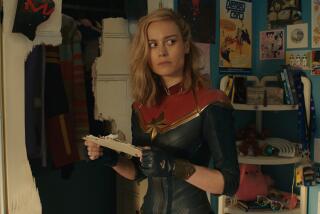Disney’s next Marvel film, ‘Black Widow,’ will hit theaters and Disney+ on July 9
- Share via
The Walt Disney Co. has set a new opening date — July 9 — for its much-anticipated Marvel Studios film “Black Widow.” The feature will be released simultaneously in theaters and on Disney+ for an additional fee, the company said Tuesday.
Disney’s “Cruella” will be released May 28, also in theaters and through the Disney+ Premier Access strategy, which charges subscribers a $30 fee for new movies. Pixar’s “Luca” will go directly to Disney+ — which currently costs $6.99 a month — on June 18 for no additional charge.
The changes are the latest sign of Disney’s ambitions to expand its streaming empire, which accelerated as COVID-19 upended the industry. Before the pandemic, Disney was the dominant studio at the box office, with multiple films grossing more than $1 billion in global receipts. Now, “Black Widow,” a movie that had a good chance of joining the billion-dollar box office club in normal times, will be available in the living room as soon as it’s in theaters.
For Marvel fans in most of the country, the plan sets up one of the biggest tests yet of people’s willingness to trek to a theater for a movie they could be watching from their couches.
The “Black Widow” decision has been the subject of will-they-won’t-they speculation in Hollywood as theaters reopen in major cities in hopes that the return of blockbusters will draw filmgoers back to the big screen. Movie houses in the greater Los Angeles area reopened last week, following the return of cinemas in New York City.
Inside the business of entertainment
The Wide Shot brings you news, analysis and insights on everything from streaming wars to production — and what it all means for the future.
You may occasionally receive promotional content from the Los Angeles Times.
Theater companies were hoping Disney would stick with its previously planned May 7 release date for “Black Widow.” The rollout of COVID-19 vaccines has boosted optimism among some analysts that audiences will start to come back to theaters when there are major Hollywood movies to see.
But continued concerns over the spread of the coronavirus and capacity limitations on theaters are still giving studios pause when it comes to their largest productions. Blockbusters depend on wide theatrical releases to become profitable.
With an estimated budget of more than $200 million, “Black Widow” certainly qualifies as a big Hollywood movie. Though films such as “Tom & Jerry” and “The Marksman” have come out during the COVID-19 pandemic, most big-budget features have been pushed back, including the 25th Bond entry, “No Time to Die” (Oct. 8), and “F9” (June 25).
Disney has been clear that providing access to its movies through streaming will continue to be a key part of its strategy as it tries to attract more subscribers to Disney+, which has already surpassed 100 million accounts since the platform’s November 2019 debut. Chief Executive Bob Chapek recently said at a Morgan Stanley investor conference that “the consumer is probably more impatient than they’ve ever been before, particularly since now they’ve had the luxury of an entire year of getting titles at home pretty much when they want them.”
Disney has pursued a three-pronged approach to releasing movies during the pandemic. The Burbank entertainment giant sent “Hamilton” and “Soul” straight to Disney+ while theaters were hobbled. With “Mulan” and “Raya and the Last Dragon,” the company put the films on Disney+ through its $30 Premier Access strategy. Disney has not disclosed viewership numbers for its Disney+ movies or Premier Access titles.
Hooked launched in 2015 with a mission to discover the next “Harry Potter” by testing stories with users. Now, it’s adapting them into short-form series.
For other big titles, Disney has chosen to push back opening dates until a theatrical release is more likely to succeed. The company on Tuesday delayed Marvel’s “Shang-Chi and the Legend of the Ten Rings” from July 9 to Sept. 3 and pushed 20th Century Studios’ “The King’s Man” from Aug. 20 to Dec. 22. Twentieth-Century movies “Free Guy,” “Deep Water” and “Death on the Nile” were also postponed.
The shifts in strategy for “Black Widow,” “Cruella” and “Luca” reflect Chapek’s stated inclination to “let the consumer be our guide in almost all situations,” as he said at the investor conference. The decision to have “Luca” bypass cinemas for Disney+ is notable because movies geared toward kids, such as “The Croods: A New Age” and “Tom & Jerry,” have tended to outperform other genres in theaters during the pandemic.
“Today’s announcement reflects our focus on providing consumer choice and serving the evolving preferences of audiences,” Kareem Daniel, chairman of Disney Media & Entertainment Distribution, said in a statement. “By leveraging a flexible distribution strategy in a dynamic marketplace that is beginning to recover from the global pandemic, we will continue to employ the best options to deliver The Walt Disney Company’s unparalleled storytelling to fans and families around the world.”
The release date for “Black Widow” has been delayed by more than a year because of the pandemic, which kept indoor theaters closed for the bulk of the last 12 months. The Scarlett Johansson superhero spy thriller’s most recent postponement was in September, when Disney moved it to May 7 from Nov. 6 amid concerns about the coronavirus’ spread.
Disney’s announcement comes just after the British movie theater company Cineworld said that Regal Cinemas — the second largest U.S. chain — will reopen its doors starting in early April. The phased reopening begins with “a limited number of cinemas” opening for Warner Bros.’ “Godzilla vs. Kong” on April 2 and will expand with “Mortal Kombat” on April 16. Both movies go to HBO Max the same day they hit theaters.
Cineworld also said Tuesday that it had reached an agreement with Warner Bros. that will return the Burbank-based studio to the model of exclusive windows for theaters in 2022. Starting next year, Warner Bros. will screen movies in theaters for 45 days before they can be released to the home through premium rentals.
The standard theatrical widow for new movies before the pandemic averaged about 90 days; attempts to close that gap were long resisted by theaters. But pandemic closures accelerated studios’ attempts to experiment with different models.
Universal previously reached similar agreements with AMC Theatres and Cinemark, the nation’s No. 1 and No. 3 chains, respectively. Under the deals, Universal movies can go to premium video on demand after 17 days. With Cinemark, the window lengthens to 31 days for movies that gross more than $50 million in an opening weekend.
More to Read
Inside the business of entertainment
The Wide Shot brings you news, analysis and insights on everything from streaming wars to production — and what it all means for the future.
You may occasionally receive promotional content from the Los Angeles Times.












